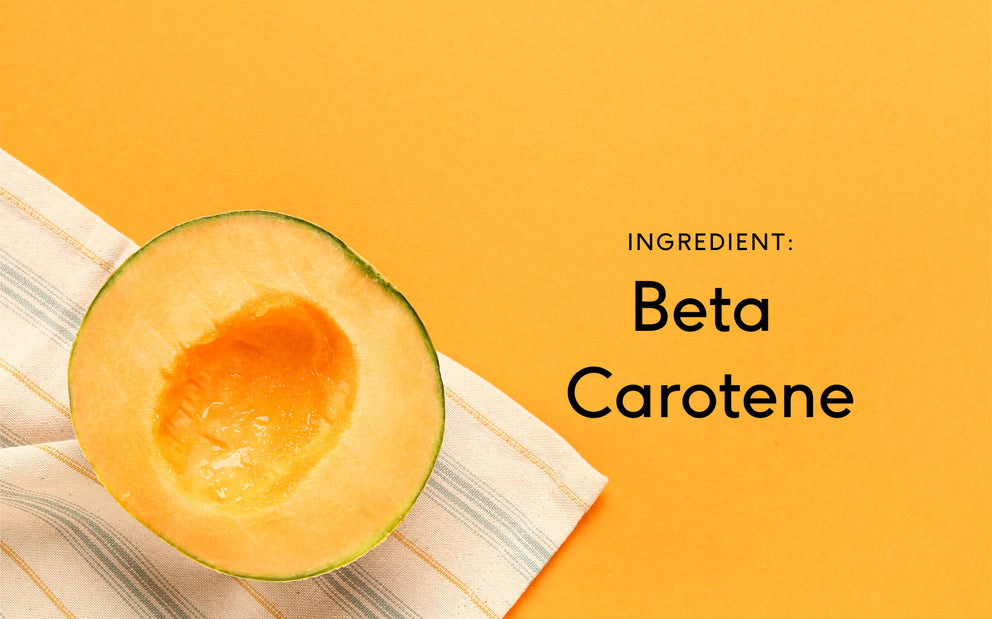Learn About Beta Carotene in 5 Minutes
Table of contents

What is beta carotene?
Beta carotene is a bright red pigment found in many plants that appears to have potent antioxidant properties. This compound can be isolated from fruits and vegetables using lab processes, but the beta carotene we use is created naturally by a type of algae called Dunaliella salina. Beta carotene has received the most attention for its potential vision benefits, but this substance also may help with immunity, cognition, skin health, and even fertility.
Is beta carotene water-soluble or fat-soluble?
Carotenoids are not soluble in water. Instead, they are soluble in fat, so they take a significant amount of time to absorb into your system.
Where can beta carotene be found naturally? Common sources of beta carotene:
- Carrots: As the name of this substance suggests, beta carotene was first discovered in carrots.
- Sweet potatoes: Beta carotene is responsible for the reddish-orange colour of sweet potatoes.
- Leafy greens: Beta carotene is also present in dark leafy greens like kale and spinach as well as romaine lettuce.
- Other fruits and vegetables: Other examples of beta carotene sources include bell peppers, cantaloupe, apricots, and broccoli.
What is the recommended daily value for beta carotene?
Beta carotene is not recognised as an essential nutrient, so there is no nutrient reference value (NRV) for this substance. However, beta carotene is considered to be a retinol activity equivalent (RAE), and some sources suggest that taking approximately 1,400-1,800 mcg of beta carotene per day could have the same nutritional effects as consuming your NRV for vitamin A.
Can you absorb enough beta carotene from food?
While beta carotene is available in a broad range of different foods, the concentrations of this substance present in food sources are usually very small. Therefore, you’ll need to take beta carotene in supplement form to make sure you’re getting enough of this potentially potent antioxidant.
Why is beta carotene necessary for your body?
Scientific literature suggests that beta carotene may have impressive antioxidant properties. In fact, an entire class of potential antioxidants, called carotenoids, are believed to fight oxidative stress due to their similarity to beta carotene and the other compounds in the carotene family. Even though they all serve the purpose of reducing oxidative stress, each antioxidant compound affects your body differently. Beta carotene may prevent age-related vision conditions, improve your immunity, and boost cognition due to the unique potential of its purported antioxidant effects.
Functions of beta carotene
- Potential vision benefits: Abundant research indicates that, in combination with vitamin C and vitamin E, beta carotene may prevent age-related macular degeneration.
- Potential immunity benefits: Studies show that beta carotene may help your cells protect themselves against viruses, bacteria, and other harmful invaders that cause infectious disease.
- Potential cognitive benefits: According to scientific research, supplementing with beta carotene may prevent age-related cognitive decline since this natural substance appears to prevent oxidative damage in the brain.
- Potential skin benefits: Studies show that the purported antioxidant properties of beta carotene may prevent skin UV damage, which would prevent your skin from ageing prematurely and lead to better overall skin health.
- Potential fertility benefits: Limited clinical research suggests that the potential antioxidant benefits of beta carotene may help women with multiple failed pregnancies become pregnant again faster.
When should you take beta carotene?
There’s never a bad time to take beta carotene. Even if you’re young and in perfect health, the potential antioxidant properties this substance appears to exert may prepare your body for the inevitability of ageing and prevent the onset of common age-related conditions. Since beta carotene may boost your immunity, it might be useful to take this substance during contagious disease outbreaks, and you may even want to supplement with beta carotene prior to time spent out in the sun to take advantage of this substance’s potential UV-protective effects.
How long do you need to take beta carotene to start experiencing its benefits?
Since beta carotene is insoluble in water, this substance is dependent on your body’s lipids for proper absorption. As a result, it may take a while to note the effects of this potentially potent antioxidant.
How long does it take for your body to digest/absorb beta carotene?
Like most fat-soluble substances, it may take your body up to a week to fully absorb the beta carotene you ingest.
How long does beta carotene stay in your body after you take it?
Fat-soluble substances like beta carotene tend to stay in your body longer the more frequently you take them. Expect beta carotene to stay in your body for at least 3-5 days.
Is beta carotene an antioxidant?
Research suggests that beta carotene may be an incredibly powerful natural antioxidant.
Can you overdose on beta carotene? What are the effects?
There are no known cases of beta carotene overdose, and this substance does not appear to be toxic. Taking excessively large amounts of beta carotene over time can, however, cause your skin to turn orange.
Does beta carotene dissolve, flush out, or build up in the body?
As a lipid-soluble substance, beta carotene tends to build up in your body’s fatty tissues.
Can you take beta carotene during a diet?
There is no evidence that beta carotene has any impact on weight gain or weight loss. Since the beta carotene we use is derived from algae, it is cruelty-free, vegan, and gluten-free.
Are there synthetic forms of beta carotene?
Synthetic forms of beta carotene are widely available on the consumer market.
Absorption rate of synthetic beta carotene
The absorption rates of synthetic and natural beta carotene appear to be roughly equal.
Why might natural forms of beta carotene be better?
Synthetic beta carotene appears to be less effective. It could even cause harmful pro-oxidant effects.
How to take beta carotene
Beta carotene is generally consumed in food or in the form of an oral supplement.
Beta carotene trends in medicine
In 2020, a study was published that indicates beta carotene may reduce general symptoms of ageing by preventing oxidative damage to your telomeres. The degeneration of these “caps” on the ends of your DNA strands is a telltale marker of the onset of senescence, the biological process of dying. Also in 2020, further evidence was put forward supporting the idea that the purported antioxidant effects of beta carotene may improve fertility. This lab study showed that beta carotene may increase the likelihood of getting pregnant and prevent pregnancy loss.
Sources
1. A Randomized, Placebo-Controlled, Clinical Trial of High-Dose Supplementation With Vitamins C and E, Beta Carotene, and Zinc for Age-Related Macular Degeneration and Vision Loss
2. Carotenoid Action on the Immune Response
3. A Randomized Trial of Beta Carotene Supplementation and Cognitive Function in Men: The Physicians' Health Study II
4. β-Carotene and other carotenoids in protection from sunlight
5. Shorter Time to Pregnancy With Increasing Preconception Carotene Concentrations Among Women With 1–2 Previous Pregnancy Losses
6. Beta-carotene, telomerase activity and Alzheimer’s disease in old age subjects
7. Association of concentrations of beta-carotene in plasma on pregnancy per artificial insemination and pregnancy loss in lactating Holstein cows













































 Back
Back





